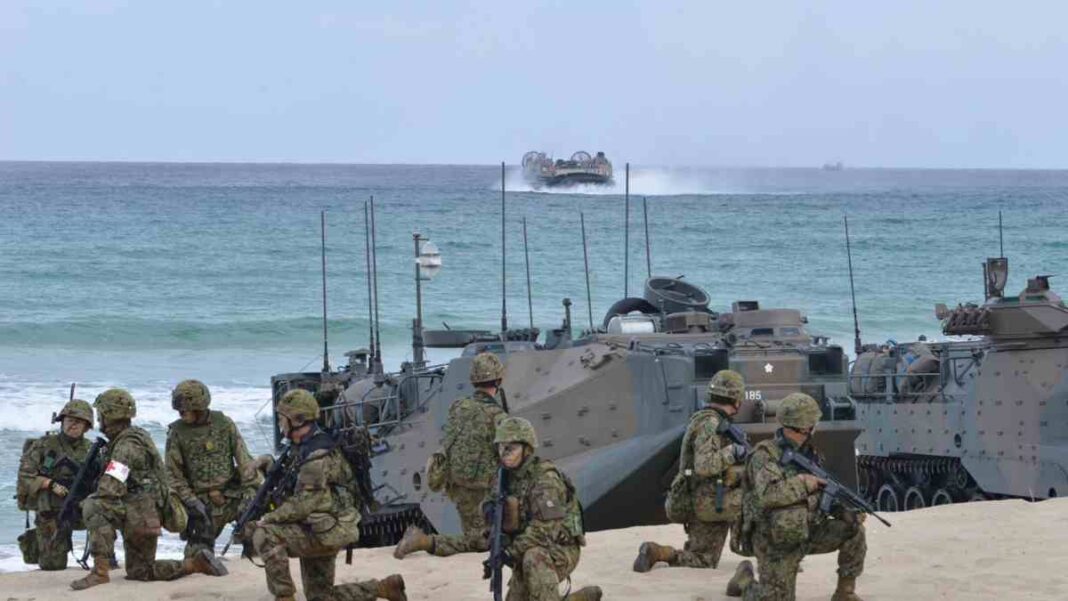JAPAN: Tokyo is expanding its defence sector to get ready for the country’s biggest military expansion since World War II. However, some of Japan’s best-known brands are hesitant to get involved in the military side of their businesses.
Japan stopped going to war in 1947, but last year it announced a five-year, $315 billion military expansion because it was worried that Russia’s invasion of Ukraine, which it calls a “special operation,” could give China the courage to invade Taiwan.
But getting commercial companies like Toshiba Corp. (6502.T), Daikin Industries Ltd. (6367.T), and Mitsubishi Electric Corp., which have been secretly arming its Self-Defense Forces (SDF) for decades, to increase production is a key part of Tokyo’s plan.
In a nation where there is a strong public sentiment against militarism, that is proving difficult to market for some of its suppliers, as per interviews with government and business leaders.
Some companies have voiced concerns about low-profit margins, the financial risk of building manufacturing facilities that might be left idle after Japan completes its military expansion, and potential harm to their public image from arms sales in private meetings with the defense ministry over the past year.
Because the talks were private, the official chose not to name names or link the problems to specific businesses. The government is working on a bill that would raise the profit margins on military equipment from a few percent to as much as 15% and give companies access to state-owned factories that they could use to increase production without taking any risks. Some people worry that might not be sufficient.
Masahisa Sato, a former deputy defense minister and influential member of the ruling party, said, “Until now, the ministry has taken the defense companies for granted.”
According to Sato, it was getting harder for Japanese executives to convince shareholders that defense sales were being made out of a sense of “patriotic duty” to shareholders rather than concentrating on more lucrative civilian endeavors.
Prime Minister Fumio Kishida’s military buildup strategy says that making weapons is a key part of national security.
However, unlike the United States Lockheed Martin Corp. (LMT.N) or Britain’s BAE Systems PLC (BAES.L), Japan does not have a national defense savior, and many of the companies that serve the SDF are known for making more mundane goods.
Mitsubishi Heavy Industries (7011.T) is Japan’s largest defence company, but military contracts only make up a small part of its $29 billion in annual sales. Mitsubishi Heavy Industries is making the next jet fighter for Japan and new missiles with longer ranges to help stop China. Its primary products are factory machinery, power plant apparatus, and components for civil aircraft.
Daikin, which makes air conditioners, also makes weapons. Toshiba, which makes electronics like printers, also makes batteries for the military. Mitsubishi Electric, which makes refrigerators and vacuum cleaners, also makes radars and missiles.
Defense officials have been meeting with these companies and other top suppliers, such as Subaru Corp. (7270.T), a maker of cars and helicopters since early last year to persuade them to increase the size of their covert military forces.
Many businesses don’t want to talk about their military troops because they don’t want to lose customers at home, where there is still a lot of anti-military feeling, or abroad, especially in China, where anger over Japan’s wartime experiences could turn political.
When Japan lifted a decades-long ban on military exports in 2014, it didn’t arouse industry growth because of bureaucrats’ excessive caution and corporate timidity, say analysts. The only company to have sold defense products abroad is Mitsubishi Electric, and a contract to deliver radars to the Philippines in 2020 is part of that deal.
An opinion poll done by the government this month shows that as tensions with China and North Korea rise in the area, more people want the military to be bigger.
In the 1,602-person survey, 41.5% of respondents—up from 29.1% in the previous survey conducted five years ago—said they wished to expand the SDF.
Even so, Japanese businesses frequently refer to their military goods as “special equipment,” said the government official.
Also Read: Spain Announces Law to Promote Gender Equality in Politics and Business



